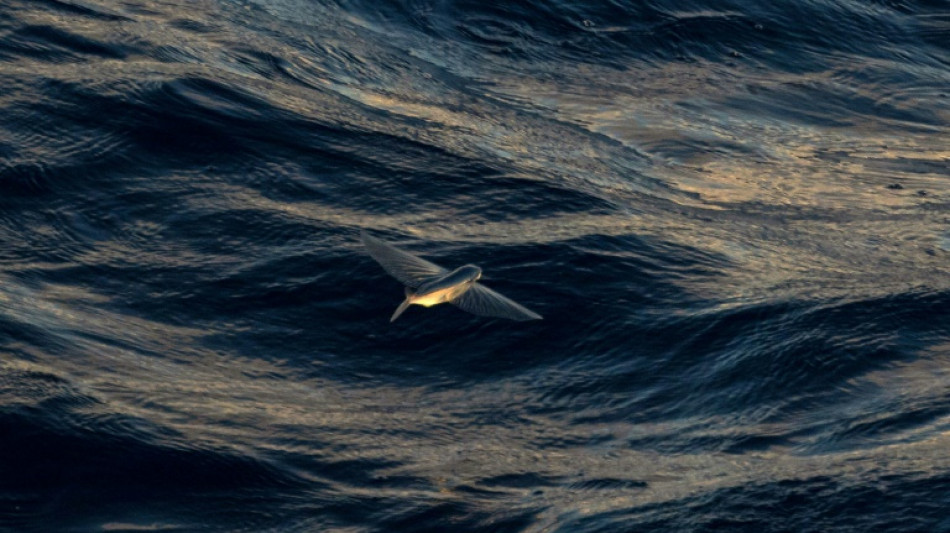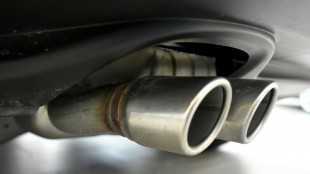
-
 Japan's Panasonic targets 10,000 job cuts worldwide
Japan's Panasonic targets 10,000 job cuts worldwide
-
Putin evokes WWII victory to rally Russia behind Ukraine offensive

-
 China exports beat forecasts ahead of US tariff talks
China exports beat forecasts ahead of US tariff talks
-
Leo XIV, the 'Latin Yankee', to celebrate first mass as pope

-
 Most stocks lifted by hopes for US-China talks after UK deal
Most stocks lifted by hopes for US-China talks after UK deal
-
IPL suspended indefinitely over India-Pakistan conflict: reports

-
 German lender Commerzbank's profits jump as it fends off UniCredit
German lender Commerzbank's profits jump as it fends off UniCredit
-
Rare bone-eroding disease ruining lives in Kenya's poorest county

-
 India says repulsed fresh Pakistan attacks as de-escalation efforts grow
India says repulsed fresh Pakistan attacks as de-escalation efforts grow
-
Zhao's historic snooker title sparks talk of China world domination

-
 'High expectations': EU looks to Merz for boost in tough times
'High expectations': EU looks to Merz for boost in tough times
-
Poisoned guests rarely invited before deadly mushroom lunch, Australia trial hears

-
 China sales to US slump even as exports beat forecasts
China sales to US slump even as exports beat forecasts
-
Indian cricket to make 'final decision' on IPL over Pakistan conflict

-
 Dethroned Bundesliga champions Leverkusen face uncertain future
Dethroned Bundesliga champions Leverkusen face uncertain future
-
China can play hardball at looming trade talks with US: analysts

-
 French monuments in trouble while PSG prepare for Champions League final
French monuments in trouble while PSG prepare for Champions League final
-
Newcastle face Chelsea in top five showdown, Alexander-Arnold in spotlight

-
 Flick's Barca must show 'hunger' in crunch Liga Clasico
Flick's Barca must show 'hunger' in crunch Liga Clasico
-
Clasico the last chance saloon for Ancelotti's Real Madrid

-
 Timberwolves overpower Warriors to level series
Timberwolves overpower Warriors to level series
-
Chinese fabric exporters anxious for US trade patch-up

-
 Putin gears up to host world leaders at lavish army parade
Putin gears up to host world leaders at lavish army parade
-
Nearing 100, Malaysian ex-PM Mahathir blasts 'old world' Trump

-
 Leo XIV, first US pope, to celebrate first mass as pontiff
Leo XIV, first US pope, to celebrate first mass as pontiff
-
Asian stocks lifted by hopes for US-China talks after UK deal

-
 Former head of crypto platform Celsius sentenced 12 years
Former head of crypto platform Celsius sentenced 12 years
-
Ex-model testifies in NY court that Weinstein assaulted her at 16

-
 Nestlé and OMP Showcase Approach to Future-Ready Supply Chain at Gartner Supply Chain Symposium/Xpo in Barcelona
Nestlé and OMP Showcase Approach to Future-Ready Supply Chain at Gartner Supply Chain Symposium/Xpo in Barcelona
-
Genflow Biosciences PLC Announces Share Subscription, Director's Dealing and Update

-
 Argo Blockchain PLC Announces 2024 Annual Results and Restoration of Listing
Argo Blockchain PLC Announces 2024 Annual Results and Restoration of Listing
-
'Great honor': world leaders welcome first US pope

-
 Pacquiao to un-retire and fight Barrios for welterweight title: report
Pacquiao to un-retire and fight Barrios for welterweight title: report
-
Trump unveils UK trade deal, first since tariff blitz

-
 Man Utd one step away from Europa League glory despite horror season
Man Utd one step away from Europa League glory despite horror season
-
Jeeno shines on greens to grab LPGA lead at Liberty National

-
 Mitchell fires PGA career-low 61 to grab Truist lead
Mitchell fires PGA career-low 61 to grab Truist lead
-
AI tool uses selfies to predict biological age and cancer survival

-
 Extremely online new pope unafraid to talk politics
Extremely online new pope unafraid to talk politics
-
Postecoglou hits back as Spurs reach Europa League final

-
 Chelsea ease into Conference League final against Betis
Chelsea ease into Conference League final against Betis
-
Pope Leo XIV: Soft-spoken American spent decades amid poor in Peru

-
 First US pope shared articles critical of Trump, Vance
First US pope shared articles critical of Trump, Vance
-
'Inexcusable' - NBA champs Boston in trouble after letting big leads slip

-
 US automakers blast Trump's UK trade deal
US automakers blast Trump's UK trade deal
-
Stocks mostly rise as US-UK unveil trade deal

-
 Trump presses Russia for unconditional 30-day Ukraine ceasefire
Trump presses Russia for unconditional 30-day Ukraine ceasefire
-
Anything but Europa League glory 'means nothing' for Man Utd: Amorim

-
 'Inexcuseable' - NBA champs Boston in trouble after letting big leads slip
'Inexcuseable' - NBA champs Boston in trouble after letting big leads slip
-
Pope Leo 'fell in love with Peru'and ceviche: Peru bishop


What will the UN high seas treaty mean for protecting the ocean?
The world's first international treaty on the high seas, set to be adopted by the United Nations on Monday, contains landmark tools for the conservation and management of international waters.
International waters -- outside the jurisdiction of any single state -- cover more than 60 percent of the world's oceans.
Ocean ecosystems create half the oxygen humans breathe and limit global warming by absorbing much of the carbon dioxide emitted by human activities.
Once adopted, the UN treaty will go into force 120 days after 60 countries have ratified it.
Here are the key points of the text approved in March. The final version to be voted on has not yet been published.
- Ocean under threat -
The treaty begins by recognizing "the need to address, in a coherent and cooperative manner, biodiversity loss and degradation of ecosystems of the ocean."
These impacts include the warming of ocean waters along with their loss of oxygen, acidification, mounting plastics and other pollutants, as well as overfishing.
The text specifies that it will apply to waters beyond countries' exclusive economic zones, which extend to a maximum of 200 nautical miles from the coasts.
It also covers what is known as "the Area", shorthand for seabed and subsoil beyond the limits of national jurisdiction. The Area comprises just over half of the planet's seabed.
The Conference of the Parties (COP) will have to navigate the authority of other regional and global organizations.
Chief among these are regional fisheries bodies and the International Seabed Authority, which oversees permits for deep-sea mining exploration in some areas and may soon make the controversial move of allowing companies to mine beyond current test runs.
- Marine protected areas -
Currently, almost all protected marine areas (MPAs) are within national territorial waters.
The treaty, however, allows for these reserves to be created in the open ocean.
Most decisions would be taken by a consensus of the COP, but an MPA can be voted into existence with a three-quarters majority, to prevent deadlock caused by a single country.
One crucial shortcoming: the text does not say how these conservation measures will be monitored and enforced over remote swathes of the ocean -- a task that will fall to the COP.
Some experts say satellites could be used to spot infractions.
Individual countries are already responsible for certain activities on the high seas that they have jurisdiction over, such as those of ships flying their flags.
- Sharing the bounty? -
On the high seas, countries and entities under their jurisdiction will be allowed to collect animal, plant, or microbial matter whose genetic material might prove useful, even commercially.
Scientists, for example, have discovered molecules with the potential to treat cancer or other diseases in microbes scooped up in sediment, or produced by sponges or marine mollusks.
Benefits-sharing of those resources has been a key point of contention between wealthy and poorer nations.
The treaty establishes frameworks for the transfer of marine research technologies to developing countries and a strengthening of their research capacities, as well as open access to data.
But it's left to the COP to decide exactly how any monetary benefits will eventually be shared, with options including a system based on specific commercialized products, or more generalized payment systems.
- Environmental impact studies -
The treaty requires signatories to assess the environmental impacts of planned activities under their control on the high seas before they are authorized in instances when such activities may have more than a minor or transitory effect.
It also calls for countries to assess the potential impact on international waters of activities within national jurisdictions that may cause "substantial pollution" or harm the high sea marine environment.
Ultimately, states are responsible for giving the green light to any potentially harmful activity -- a role NGOs hoped would go to the COP, to make controversial approvals more difficult.
The treaty also requires states to publish updates on an activity's environmental impacts. Approvals can be called into question if unanticipated impacts arise.
Though they are not specifically listed in the treaty, activities that could come under regulation include transport and fishing, as well as more controversial subjects such as deep-sea mining or even geo-engineering initiatives to mitigate global warming.
O.Karlsson--AMWN



